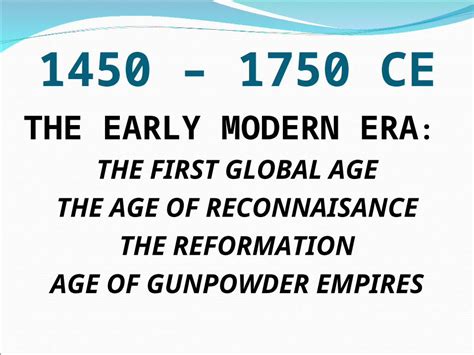The Rise of Maritime Empires
The Age of Exploration began in the 15th century with the Portuguese and Spanish leading the way. They established vast maritime empires in Asia, Africa, and the Americas.

- Portugal: Founded trading posts in Africa and Asia, and established the first European colony in Brazil.
- Spain: Conquered and ruled large parts of Central and South America, including Mexico and Peru.
The Scientific Revolution
The Scientific Revolution was a period of rapid scientific advancement in the 16th and 17th centuries. It challenged traditional beliefs and led to new discoveries in astronomy, physics, and biology.
- Nicolaus Copernicus: Proposed that the Earth revolves around the sun, not vice versa.
- Isaac Newton: Developed the laws of motion and universal gravitation.
- William Harvey: Discovered the circulation of blood.
The Reformation and Religious Wars
The Reformation was a religious movement that challenged the authority of the Catholic Church. It led to the establishment of Protestantism and the emergence of new religious groups.
- Martin Luther: Led the Protestant Reformation in Germany, challenging the sale of indulgences and the authority of the pope.
- John Calvin: Founded Calvinism, a Protestant movement that emphasized predestination and the sovereignty of God.
The Enlightenment
The Enlightenment was an intellectual movement that emphasized reason and scientific inquiry. It challenged traditional authorities and led to new ideas about government, society, and individual rights.
- John Locke: Developed the concept of natural rights, including life, liberty, and property.
- Montesquieu: Advocated for the separation of powers in government.
- Voltaire: Criticized religious intolerance and advocated for freedom of speech.
The Impact of European Expansion
European expansion had a profound impact on both Europe and the world beyond.
- Economic Growth: The rise of maritime trade and the exploitation of new resources led to economic growth in Europe.
- Cultural Exchange: European explorers introduced new ideas, technologies, and goods to the Americas, Africa, and Asia.
- Spread of Disease: European diseases, such as smallpox and measles, decimated indigenous populations in the Americas.
Tips and Tricks for Studying AP Euro Unit 3
- Create a Timeline: Organize key events and figures chronologically to see the connections between them.
- Use Primary Sources: Analyze historical documents, letters, and speeches to gain firsthand insights into the events and ideas of the time.
- Engage in Discussion: Discuss the material with classmates and teachers to deepen your understanding.
- Practice Essay Writing: Regularly write essays to improve your analysis and argumentation skills.
Common Mistakes to Avoid
- Overgeneralizing: Avoid making broad statements without supporting evidence.
- Ignoring Context: Consider the historical context when analyzing events and ideas.
- Confusing Correlation with Causation: Distinguish between events that are merely correlated and events that directly cause each other.
- Assuming European Superiority: Avoid the eurocentric perspective and acknowledge the contributions of non-European cultures.
How to Step-by-Step Approach to AP Euro Unit 3
- Review the Syllabus: Familiarize yourself with the topics and themes covered in the unit.
- Read the Textbook: Read the assigned textbook chapters and take notes on key concepts and events.
- Analyze Primary Sources: Examine primary sources to gain different perspectives on the historical events.
- Participate in Class Discussions: Engage in discussions to exchange ideas and deepen your understanding.
- Practice Essay Writing: Write essays to apply your knowledge and develop your analytical skills.
- Review Regularly: Regularly review your notes and practice questions to reinforce your knowledge.
Tables
| Topic | Timeline | Key Figures | Impact |
|---|---|---|---|
| Age of Exploration | 1415-1600 | Vasco da Gama, Christopher Columbus, Ferdinand Magellan | Maritime empires, global trade |
| Scientific Revolution | 1500-1700 | Nicolaus Copernicus, Isaac Newton, William Harvey | Scientific advancements in astronomy, physics, biology |
| Reformation | 1517-1648 | Martin Luther, John Calvin | Protestant Reformation, religious wars |
| Enlightenment | 1700-1800 | John Locke, Montesquieu, Voltaire | Emphasis on reason, individual rights |
New Word to Generate Ideas for New Applications
Synergize: Combining different elements or concepts to create something new and innovative.
- Education: Synergizing online and in-person learning to create blended learning experiences.
- Health Care: Synergizing traditional medicine with alternative therapies to improve patient outcomes.
- Business: Synergizing technology and customer service to enhance the customer experience.
